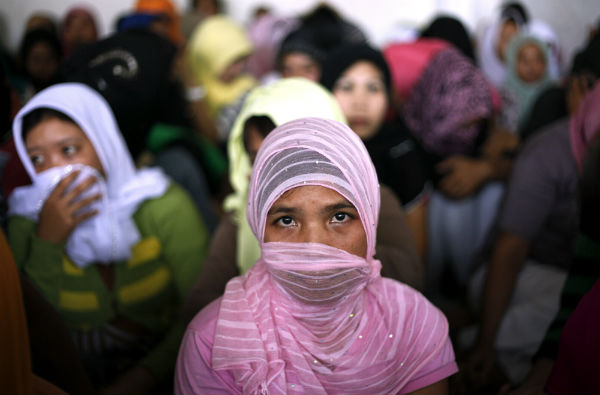Indonesia has refused to pay 10 million riyal
(78.5m baht) in blood money to save the life of a maid sentenced to
death in Saudi Arabia.
 An Indonesian migrant worker prepared to be sent to Saudi Arabia,
covers her face during an inspection by the police after a raid at a
shelter in Bekasi, West Java, Indonesia, in this file photo from June
2011. Saudi media reported that 25 Indonesian maids are on death row in
the kingdom and 22 others have been pardoned and sent home. (EPA photo)
An Indonesian migrant worker prepared to be sent to Saudi Arabia,
covers her face during an inspection by the police after a raid at a
shelter in Bekasi, West Java, Indonesia, in this file photo from June
2011. Saudi media reported that 25 Indonesian maids are on death row in
the kingdom and 22 others have been pardoned and sent home. (EPA photo)The Indonesian government said that it would refuse a request made to a court by the family of the murdered Saudi that Ahmed pay blood money to annul her death sentence, according to an Arab News report on Tuesday.
Indonesia would would approach the victim’s family to ask for forgiveness, its foreign ministry’s director for legal aid and protection of Indonesian nationals overseas, Tatang Budie Utama Razak, said.
“We need certainty,” Mr Tatang said.
“If the 10 million riyal in blood money has been paid, they will likely ask for another 30 or 50 million riyal.”
Mr Tatang cited previous cases where blood money had been paid in Saudi Arabia to save convicted Indonesian maids from execution as setting a precedent for higher financial demands.
“First we paid 55,000 riyal for Banayah binti Banhawi Sawawi, another Indonesian worker. Then we paid 2 million riyal for Darsem binti Dawud Tawa, also a housemaid. The amounts continue to rise. We don’t want this to be just a matter of financial transaction.”
Anis Hidayah, executive director of Indonesian rights group Migrant Care, said Ahmed was arrested in 2006, three months after arriving in Saudi Arabia to work as a housemaid.
In 2009, Ahmed called her family to tell them she had been sentenced to death after she killed her employer during an argument.
According to reports, Ahmed beat her employer with bread dough and struck the nape of her neck. She said she was acting in self-defence after her employer screamed at her while she was cooking, grabbed her hair and tried to bang her head into a kitchen wall.
The employer fell down when she was struck and later died of her injuries.
“Indonesian officials are still engaged in negotiations with the family of the victim. No final result has yet come out,” Rayyanul Sangadji, an Indonesian diplomat in Riyadh, told Arab News.
A Saudi court sentenced an Indonesian housemaid to death on Monday after she was convicted of murdering her employers' four-year-old child.
The maid was "charged with decapitating the girl with a cleaver when her parents were away at work and her sisters were at school," the Saudi Gazette reported, adding that the woman's lawyer will file an appeal.
The victim's parents have refused to forgive the maid in return for blood money, the daily said.
The maid's lawyer, appointed by the Indonesian mission in Riyadh, said that the consulate will initiate legal action in Jakarta against a man who the newspaper said had convinced, via text messages, the woman to commit the crime.
In April last year, local media reported that 25 Indonesian maids are on death row in Saudi Arabia and 22 others have been pardoned and sent home.
In June, 2011, Indonesian maid Ruyati binti Sapubi, 54, was beheaded after she was convicted of killing her Saudi employer, prompting Indonesia to recall its ambassador in Saudi Arabia for "consultations."
Indonesian anger over the treatment of its manual labourers in the oil-rich Gulf monarchy has grown after a spate of cases of abuse and killings.
Indonesia had also announced a moratorium on sending migrant workers to Saudi Arabia, where hundreds of thousands of Indonesians toil as maids and labourers.
Saudi is experiencing a shortage of domestic workers due to restrictions placed on domestic workers by foreign governments including Indonesia, Sri Lanka and the Philippines.
Rights groups say millions of mostly Asian domestic workers are regularly exposed to physical and financial abuse in Saudi Arabia and the Gulf states because of poor or non-existent labour laws.
Saudi Arabia’s ban on Thai workers remains in place, with its interior ministry last week rejecting a Saudi labour ministry request to resume recruitment of maids from Thailand to meet demand.
 9:55 PM
9:55 PM
 specialshowtoday
specialshowtoday

 Posted in:
Posted in: 

0 comments:
Post a Comment